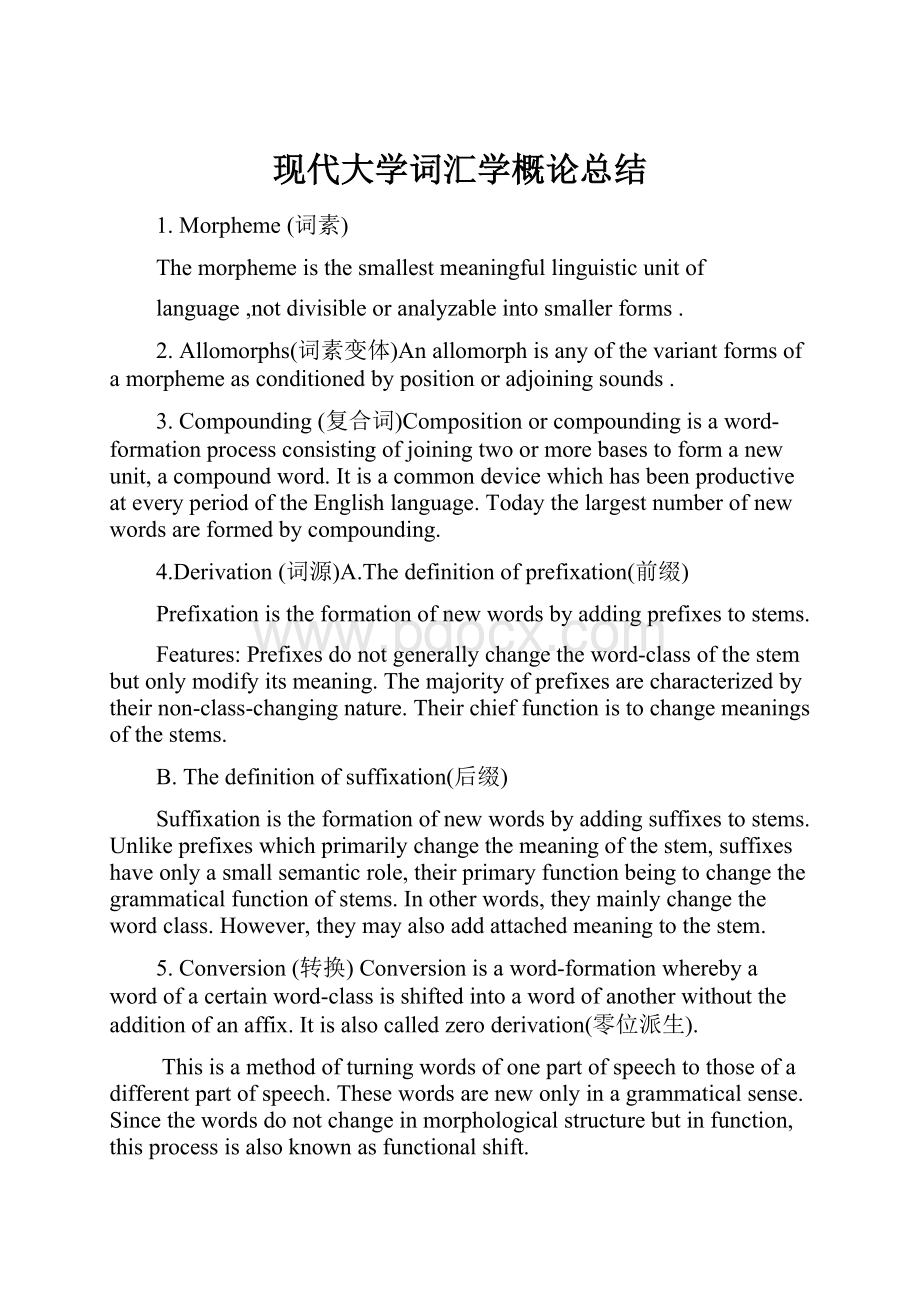现代大学词汇学概论总结.docx
《现代大学词汇学概论总结.docx》由会员分享,可在线阅读,更多相关《现代大学词汇学概论总结.docx(9页珍藏版)》请在冰豆网上搜索。

现代大学词汇学概论总结
1.Morpheme(词素)
Themorphemeisthesmallestmeaningfullinguisticunitof
language,notdivisibleoranalyzableintosmallerforms.
2.Allomorphs(词素变体)Anallomorphisanyofthevariantformsofamorphemeasconditionedbypositionoradjoiningsounds.
3.Compounding(复合词)Compositionorcompoundingisaword-formationprocessconsistingofjoiningtwoormorebasestoformanewunit,acompoundword.ItisacommondevicewhichhasbeenproductiveateveryperiodoftheEnglishlanguage.Todaythelargestnumberofnewwordsareformedbycompounding.
4.Derivation(词源)A.Thedefinitionofprefixation(前缀)
Prefixationistheformationofnewwordsbyaddingprefixestostems.
Features:
Prefixesdonotgenerallychangetheword-classofthestembutonlymodifyitsmeaning.Themajorityofprefixesarecharacterizedbytheirnon-class-changingnature.Theirchieffunctionistochangemeaningsofthestems.
B.Thedefinitionofsuffixation(后缀)
Suffixationistheformationofnewwordsbyaddingsuffixestostems.Unlikeprefixeswhichprimarilychangethemeaningofthestem,suffixeshaveonlyasmallsemanticrole,theirprimaryfunctionbeingtochangethegrammaticalfunctionofstems.Inotherwords,theymainlychangethewordclass.However,theymayalsoaddattachedmeaningtothestem.
5.Conversion(转换)Conversionisaword-formationwherebyawordofacertainword-classisshiftedintoawordofanotherwithouttheadditionofanaffix.Itisalsocalledzeroderivation(零位派生).
Thisisamethodofturningwordsofonepartofspeechtothoseofadifferentpartofspeech.Thesewordsarenewonlyinagrammaticalsense.Sincethewordsdonotchangeinmorphologicalstructurebutinfunction,thisprocessisalsoknownasfunctionalshift.
6.AcronymyA.Thedefinitionofinitialisms
Initialisms(首字母连写法):
atypeofshortening,usingthefirstlettersofwordstoformapropername,atechnicalterm,oraphrase;aninitialismispronouncedletterbyletter.
B.Thedefinitionofacronyms
Acronyms(首字母拼音法):
wordsformedfromtheinitiallettersofwordsandpronouncedaswords.
Acronymsdifferfrominitialismsinthattheyarepronouncedaswordsratherthanassequencesofletters.
7.BlendingBlending(拼缀法)isaprocessofword-formationinwhichanewwordisformedbycombiningpartsoftwowords.Theresultofsuchaprocessiscalledablendword.Blendingisthusaprocessofbothcompoundingandabbreviation.
8.ClippingClipping(截短语)istoshortenalongerwordbycuttingapartofftheoriginalandusingwhatremainsinstead.Forexample,planeandexamareoftenusedinplaceofaeroplane,andexaminationrespectively.
9.Back-formationBack-formation(逆成法)isaprocessofword-formationbywhichawordiscreatedbythedeletionofasupposedsuffix.Itisalsoknownasareversederivation.
Lookatthefollowingwords,thinkaboutwhatsuffixescanbeaddedtoit:
care:
careful,careless,carefully,carelessly,carelessness
friend:
friendly,friendship
quick:
quickly,quicken,quickish,quicky
10.ReduplicationReduplication(重叠法)isaminortypeofword-formationbywhichacompoundwordiscreatedbytherepetition
(1)ofonewordlikeso-so;
(2)oftwoalmostidenticalwordswithachangeinthevowelssuchaspingpong;(3)oftwoalmostidenticalwordswithachangeintheinitialconsonantsasinteenyweeny.
11.Motivation(理据)TypesofWordMeaning
11.1GrammaticalMeaningGrammaticalmeaning(语法意义)referstothatpartofmeaningofthewordwhichindicatesgrammaticalconceptorrelationshipssuchasthewordclass,singularandpluralformsofnouns,tensemeaningofverbsandtheirinflectionalforms(forget,forgets,forgot,forgotten,forgetting).
11.2LexicalmeaningLexicalmeaning(词汇意义)isthemeaningofanisolatedwordinadictionary.Thiscomponentofmeaningisidenticalinalltheformsoftheword.
E.g.‘go,goes,went,gone,going’possessdifferentgrammaticalmeaning.Buttheyhavethesamelexicalmeaningexpressingtheprocessofmovement.
Lexicalmeaningitselfhastwocomponents:
conceptualmeaningandassociativemeaning.
11.3ConceptualmeaningConceptualmeaning(概念意义)(alsoknownasdenotativemeaning)isthemeaninggiveninthedictionaryandformsthecoreofwordmeaning.Conceptualmeaningformsthebasisforcommunicationasthesamewordhasthesameconceptualmeaningtoallthespeakersofthesamelanguage.
Sun:
aheavenlybodywhichgivesofflight,heat,andenergy
Mother:
afemaleparent
11.4AssociativemeaningAssociativemeaning(关联意义)isthesecondarymeaningsupplementedtotheconceptualmeaning.Itdiffersfromtheconceptualmeaninginthatitisliabletotheinfluenceofsuchfactorsasculture,experience,religion,geographicalregion,classbackground,education,etc.
Associativemeaningcomprisesfourtypes:
A.connotativemeaningConnotativemeaning(内涵意义)
Incontrasttodenotativemeaning,connotativemeaningreferstotheovertonesorassociationswhichawordsuggestsorimplies.
Mother(afemaleparent)isoftenassociatedwith‘love’,‘care’,‘tenderness’,‘forgiving’,etc.
Home(adwellingplace)maysuggest‘family,warmth,safety,love,convenience’,etc.‘Eastorwest,homeisbest’.
Statesmanimplies‘loyalty,devotiontopublicwelfare’;politicianimplies‘deceit,power-drunk,bragging,villainy’.
B.stylisticmeaningStylisticmeaning(文体意义)
Wordsmayhavestylisticfeatures,whichmakethemappropriatefordifferentcontexts.
Thisstylisticdifferenceisespeciallytrueofsynonyms.Itisobservedthattherearefewwordswhichhaveboththesameconceptualmeaningandstylisticmeaning.
C.affectivemeaningAffectivemeaning(情感意义)
Affectivemeaningindicatesthespeaker’sattitudetowardsthepersonorthinginquestion.
Wordsthathaveemotivevaluesmayfallintotwocategories:
Appreciativeorcommendatory(褒义):
wordsofpositiveovertonesusedtoshowappreciationorapproval.
Pejorativeorderogatory(贬义):
wordsofnegativeconnotationsimplydisapproval,contemptorcriticism.
D.collocativemeaningCollocativemeaning(搭配意义)
Collocativemeaningconsistsoftheassociationsawordacquiresinitscollocation.Inotherwords,itisthatpartofthewordmeaningsuggestedbythewordsbeforeorafterthewordindiscussion.
12.PolysemyPolysemy(一词多义)canbedefinedasatermusedinsemanticanalysistorefertoalexicalitemwhichhasarangeofdifferentmeanings.
Polysemicwordsaresignsofanadvancedculture.Itisalsoanessentialfeatureofalanguage’seconomyandefficiency.
Threewaysforalanguagetoexpressnewideas,newprocessesandnewproducts,etc.:
Formanewword;
Borrowawordfromotherlanguages;
Addnewmeaningstoestablishedwords.
13.HomonymyHomonyms(同形异义):
Words,which,thoughdifferentinmeaning,arepronouncedalike,orspelledalike,orboth.
Typesofhomonyms:
Perfecthomonyms同音异义:
Wordsidenticalinsoundandspellingbutdifferentinmeaning.
date/date;bear/bear;bank/bank
Homophones同音:
Wordsidenticalinsoundbutdifferentinspellingandmeaning.
write/right;dear/deer;son/sun
Homographs同形异义:
Wordsidenticalinspellingbutdifferentinsoundandmeaning.
lead/lead;bow/bow;tear/tear
14.Synonymy(同义关系)---semanticsimilarity
A.Absoluteorperfectsynonyms(完全同义词):
a.wordswhichareidenticalinmeaninginallitsaspects,I.e.bothingrammaticalandlexicalmeaning,includingconceptualandassociativemeaning.Suchsynonymsarerareinnaturallanguages.
b..compoundingandcomposition;
c.wordbuildingandword-formation;
d.malnutritionandundernourishment
B.Relativeorpartialsynonyms(部分同义词):
wordswhicharesimilarornearlythesameindenotation,butembracedifferentshadesofmeaningordifferentdegreeofagivenquality.Itisthistypeofsynonymsweshalldealwithhere.
15.Antonymy(反义关系)---semanticopposition
A.ContrariesContraries(相对反义词/两极反义词)
Antonymsofthistypearebestviewedintermsofascalerunningbetweentwopolesorextremes.Thetwooppositesaregradable(可分级的).
hot,warm,cool,cold
beautiful,pretty,good-looking,plain,ugly
old-young,big-small,poor-rich
B.ComplementariesComplementaries(绝对反义词/互补反义词)
Theseantonymstrulyrepresentoppositeness.Theyaresoopposedtoeachotherthattheyaremutuallyexclusiveandadmitnopossibilitybetweenthem(non-gradable).
dead-alive,present-absent,male-female,true-false,approval-disapproval,capable-incapable
Prefixes:
dis-,in-,il-,ir-,im-,un-……
C.ConversivesConversives(换位反义词/关系反义词)
Thisthirdtypeconsistsofrelationalopposites.
Husband-wife,employer-employee,debtor-creditor
Above-below,infrontof-behind,up-down
Buy-sell,give-receive,go-come,gain-lose
D.SemanticincompatiblesSemanticincompatibles(多项不相容词)
North,south,east,westSpring,summer,autumn,winter
January,February,March,…DecemberSunday,Monday,….Saturday
16.Hyponymy(上下义关系)---semanticinclusion
Hyponymydealswiththerelationshipofsemanticinclusion.Itreferstotherelationshipwhichobtainsbetweenthegenus(generallexicalitem)andthespecies(specificlexicalitems).
Thegenerallexicalitemiscalledthesuperordinate(上义词).
Thespecificwordsareknownashyponyms(下义词).
17.Thesemanticfieldtheory(语义场理论)
Thevocabularyofalanguageisnotsimplyalistingofindependentitems,butisorganizedintoareasorfields,themembersofwhicharejoinedtogetherbysomecommonsemanticcomponent.Thewholevocabularycanbedividedupintofields.Wordsineachfieldaresemanticallyrelatedanddefineoneanother.Vocabularyisseenas‘anintegratedsystemoflexemesinterrelatedinsense’.
------JostTrier(aGermanlinguist)
Thesemanticfieldofthesameconceptmaynothavethesamemembersindifferentlanguages,thuslexicalgaps(词汇空缺)occur.
Thesemanticfieldofkinship